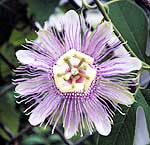| Back | Herbal Archives | |
Parsley
 |
Parsley, a member of the carrot family, is a widely respected and nutritious herb that has been known and prescribed for over 2,000 years. Hippocrates valued parsley as a "cure all" ingredient in formulas for general tonics, poison antidotes, anti-rhumetics and relief for kidney and bladder stones. The Hebrews use it at Passover to symbolize spring and rebirth. Parsley is high in vitamins A, C, B1 and B2, and is rich in iron and other minerals. A cup of parsley contains more beta carotene than a carrot, more calcium than a cup of milk, almost twenty times as much iron as a serving of liver, and twice the vitamin C of an orange. It is a natural antibiotic and free radical that contains histamine inhibitors which detoxify and cleanse the body. It is particularly effective as an herbal diuretic and as an aid in controlling high blood pressure. Because it can stimulate menstruation, pregnant women should not use parsley in a medicinal dosage. |
Passion Flower
 |
The herb Passion Flower (genus passiflora), also known as maypop, is a hardy woody vine that grows up to thirty feet in length and bears gorgeous white flowers with pink or purple centers and delicious, edible fruit. For centuries, Amazon Indians have used it (called Maracuja in the Amazon) as a sedative. It was named Passion Flower by Spanish missionaries, as it reminded them of the passion or suffering of Christ. It is indigenous to the southeast United States, parts of Mexico and the Amazon region of South America. Because of its tranquilizing effects on the central nervous system, it is widely used today as a sedative, antispasmodic and nerve tonic, providing symptomatic relief of insomnia, asthma, hysteria, and PMS. There are no reported side effects for passion flower, although it is not recommended for use by pregnant women. |
Copyright 2022 - Lyn Hopkins